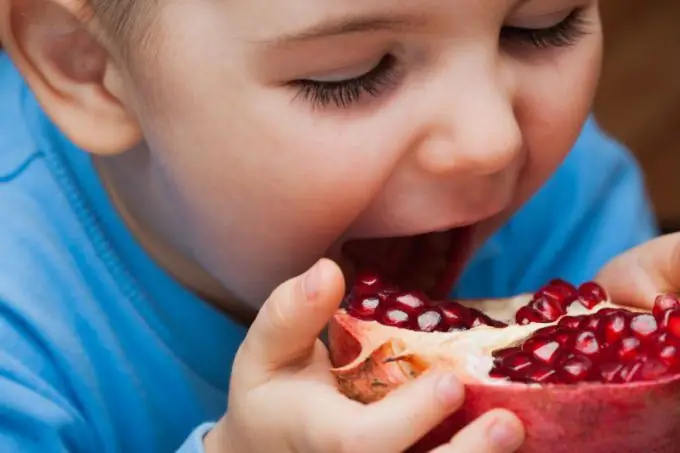- Author Horace Young young@householdfranchise.com.
- Public 2023-12-16 10:35.
- Last modified 2025-01-23 11:41.
Fruits are of great benefit to a growing body, so a child should be accustomed to eating them from an early age. However, a number of foods can cause allergies or contain seeds that can be accidentally swallowed by a toddler, so they should be given with caution if a child is under 2 years of age. One of these fruits is pomegranate.

The benefits of pomegranate
Pomegranate pulp contains 15 types of amino acids that improve brain function. Also, this fruit is an active source of vitamin C - a strong antioxidant that strengthens the endocrine and nervous systems. Vitamin B, which is included here, is responsible for the formation of hemoglobin, the functioning of the nervous system and the growth of muscle tissue, and numerous fruit acids help in the absorption of trace elements.
A separate benefit for the child's body is provided by such a component of pomegranate pulp as calcium, without which the formation of bones, hair and nails is impossible. The condition of muscles and bones is also positively influenced by potassium and phosphorus, which are present in large quantities in pomegranate. Thus, this fruit looks like an ideal product for a growing body, but if the child is still too young, you will have to limit yourself to pomegranate juice.
How to give pomegranates to a child correctly
The age of two is already suitable for the active acquaintance of the baby with a varied and healthy food. At the same time, it is important that the child is not allergic, especially to fructose. In addition, at two years old, children are unlikely to be able to neatly and safely eat pomegranate pulp, which contains many small seeds. Therefore, it is necessary to squeeze fresh juice from the fruit and give the child a sample in the amount of one teaspoon with the addition of boiled water in a 1: 1 ratio.
If no allergic reactions are observed within 2-3 days, and the baby willingly drinks pomegranate juice, the daily portion can be increased to 100-150 ml. This amount will be quite enough to saturate the body with all useful substances. Exceeding the daily dose of vitamins and minerals at this age can lead not only to allergies, but also to various diseases, especially gastrointestinal diseases.
As for the whole pomegranate pulp, it is recommended to teach a child to it only after three years, having shown how to eat the fruit correctly. No more than half of the whole fruit should be offered per day. Whole pomegranate is allowed to be consumed by a child only at the age of seven. Only then will no aggressive effect be exerted on his body.






